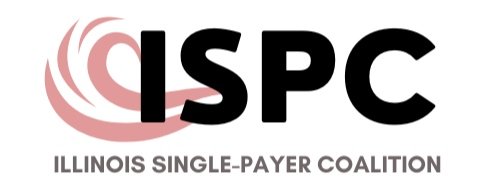Position Statement on Senate Bill 1129: Medicare for All Act of 2019
The Illinois Single-Payer Coalition welcomes the introduction of Senate Bill 1129 the Medicare for All Act of 2019. We believe this bill takes important steps towards creating the kind of single-payer system we support. However, there are areas for improvement. We would:
Simplify and shorten the transition.
The bill outlines a four-year transition. Each year it decreases the age threshold at which people become eligible for Medicare (the first year, those over 55 are eligible; the second year, those over 45 are eligible, etc). A Medicare transition plan with varying premiums and cost-sharing subsidies would be created. The time and resources required to create and implement this transition could instead be spent on setting up the actual single-payer plan.
Furthermore, in the transition phase, individuals will be allowed to purchase corporate-based Medicare Advantage plans. This is worrisome. Private insurance companies are currently investing heavily in Medicare Advantage. Given the four-year transition, they would flood the market and attempt to embed themselves in the Medicare market permanently, even post-transition. Of course, that is not what we want. It is not necessary for a transition to single payer to be drawn out over four years. Original Medicare was implemented within one year in 1965.
Most importantly: the legislation will be vulnerable to repeal over the four-year period. Political opposition could smear the name of single payer before we even have it.
Ban investor-owned facilities.
With the Senate legislation, healthcare facilities could still be owned by for-profit entities. While the bill states that payments to providers cannot be spent on marketing, profits, union-busting, or political contributions, it is unclear how these restrictions will be monitored or enforced. We expect that investor-owned facilities, as we see in so many cases, will bend the rules and regulations to their advantage, and patient care and staff working conditions will be compromised.
Include institutional care.
This bill covers home and community-based services, which includes home health, caregivers, and case management. This is a huge improvement over the previous Senate bill, which did not include these services. However, long-term institutional care (i.e. nursing homes) is not covered. Institutional care would remain under state Medicaid programs. There are no care standards or funding minimums (other than to receive current federal funding) established in this bill. Institutional care is severely underfunded in many states, and as a result, poor patient care and abuse are rampant. We believe institutional care should be part of a strong federal program to secure stable funding and appropriate, standardized care.
End value-based payment systems.
Value-based (pay-for-performance) payments were introduced largely with the Affordable Care Act. They reward providers for better patient outcomes, with the intention of improving outcomes. However, they have shown no improvement in patient outcomes; instead they have resulted in discrimination towards the poor and sick and an increase in provider burnout and administrative load.
Adjust how hospitals are funded.
The bill does not include global budgets and does not separate out capital expenditures. Global budgets pay hospitals a lump sum of money on a regular basis to cover operating expenses, which eliminates extremely wasteful per-patient billing. Capital expenditures are funds used to make improvements to hospitals, such as construction projects and equipment purchases. Capital expenditures should be separate from operating expenses to prevent hospitals from becoming over-resourced or under-resourced. Hospitals should be designed to meet the needs of the community.
Eliminate cost-sharing on pharmaceuticals.
The bill includes no cost-sharing (no co-payments, premiums, nor deductibles) on covered services with the exception of some pharmaceuticals, up to a $200 maximum a year. We know that any cost-sharing will deter people from using that service. We want individuals to be able to take care of their health, including taking prescription drugs as necessary and appropriate.
